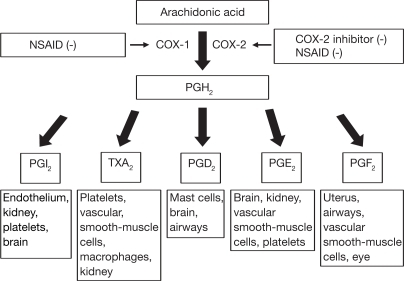I like KDM. We had a brief chat in 1999 at a conference in Sydney, and I have had a chat with him (online or phone, I don't recall now) at least once since. I think he is genuine. I think that history also shows he gets too enthusiastic too fast.
Its funny about PGE2, that hypothesis is what drew me into ME research in 1993. In fact I was on a modified diet to limit it. This had side effects. There was short term gain, but long term decline.
PGE2 is derived from arachidonic acid, which also leads to many other series 2 eicosanoids. However its an essential fatty acid.
Previously it has been postulated that we over release free arachidonic acid (alcohol does this for example) via oxidative stress and other mechanisms, leading to inappropriate eicosanoid synthesis. It most likely is not just PGE2 either.
However this research has languished for two decades and not much has been done. You cannot just cut arachidonic acid out of the diet either, as being an essential nutrient you will die without it.
Those of us who are salicylate sensitive will also not make enough of it.
However as you will see from the chart these paths are inhibited by NSAIDs so you would think they would have more impact on ME. If there is a problem here, and its a big IF, then its about fine scale regulation of arachidonic acid, not blanket inhibition. This does however become more of an issue in anyone with low cortisol, as the normal function of cortisol is to lower arachidonic acid use.
So I am going to say I think its unlikely the issue they are alluding to is PGE2. Whatever it is, there is a need for ongoing research. Promising leads are not validated and replicated hypotheses until after the science is done.

